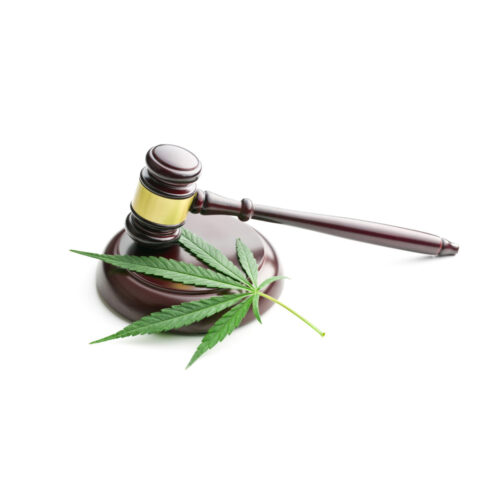Cannabis is a plant of the Cannabaceae family and contains more than eighty biologically active chemical compounds. The most known compounds are delta-9-tetrahydrocannabinol (THC) and cannabidiol (CBD). Parts of the Cannabis sativa plant have been controlled under the Controlled Substances Act (CSA) since 1970 under the drug class “Marihuana” (commonly referred to as “marijuana”). “Marihuana” is listed in Schedule I of the CSA due to its high potential for abuse, which is attributable in large part to the psychoactive effects of THC, and the absence of a currently accepted medical use of the plant in the United States.
Currently, thirty-three states, the District of Columbia, Guam, and Puerto Rico have all legalized the use of marijuana to some degree. Yet the possession, distribution or sale of marijuana remains illegal under federal law, which means any contact with money that can be traced back to state marijuana operations could be considered money laundering and expose a bank to significant legal, operational and regulatory risk.
CANNABIDIOL (CBD:
CBD derived from marijuana remains in the Schedule 1 of the Controlled Substances Act (CSA) meaning it has no accepted medical use. At federal level, the possession, use, distribution, and transportation of CBD containing more than 0.3% THC legal limit is a federal offense.
HEMP:
At the federal level, the Agriculture Improvement Act of 2018 (the 2018 Farm Bill) signed into law on Dec. 20, 2018, changes certain federal authorities relating to the production and marketing of hemp, defined as “the plant Cannabis sativa L. and any part of that plant, including the seeds thereof and all derivatives, extracts, cannabinoids, isomers, acids, salts, and salts of isomers, whether growing or not, with a delta-9 tetrahydrocannabinol concentration of not more than 0.3 percent on a dry weight basis. These changes include removing hemp from the Controlled Substances Act which means that cannabis plants and derivatives that contain no more than 0.3 % THC on a dry weight basis are no longer controlled substances under federal law.
Put differently, CBD containing less than 0.3 percent THC is legal under federal law.
STATE MARIJUANA LAWS:
There are presently 10 US states where Cannabis, including marijuana and hemp, are legal for medicinal and recreational use.
A total of 47 states have legalized marijuana-derived CBD only for medicinal purposes. The qualifying conditions may vary by state; some states are very liberal about the medical use of cannabidiol while others permit this compound only under highly specific circumstances (like an approved medical diagnosis).
Three states have taken a strong stance against marijuana-derived CB — Idaho, Nebraska, and South Dakota. Even hemp-derived cannabidiol is stuck in a legal grey-area in those states.
|
STATES WITH REGULATIONSS THAT PERMIT USE OF MARIJUANA-DERIVED CBD FOR RECREATIONAL AND MEDICAL USE |
||||||||
| Alaska | California | Colorado | Maine | Massachusetts | Michigan | Nevada | Oregon | Vermont |
|
Washington |
Washington DC |
|
||||||
|
STATES THAT ALLOW THE MEDICAL USE OF MARIJUANA-DERIVED CBD FOR VARIOUS CONDITIONS |
||||||||
| Alaska | Arizona | Arkansas | California | Colorado | Connecticut | Delaware | Florida | Hawaii |
| Illinois | Maine | Maryland | Massachusetts | Michigan | Minnesota | Montana | Nevada | New Hampshire |
| New Jersey | New Mexico | New York | North Dakota | Ohio | Oregon | Pennsylvania | Rhode Island | Vermont |
| Washington | West Virginia | |||||||
| STATES WITH REGULATIONS THAT PERMIT THE USE OF CBD FROM MARIJUANA UNDER CERTAIN CIRCUMSTANCES | ||||||||
| Alabama | Georgia | Indiana | Iowa | Kentucky | Mississippi | Missouri | North Carolina | Oklahoma |
| South
Carolina |
Tennessee | Texas | Utah | Virginia | Wisconsin | Wyoming | ||
Gilbert Reese continues to monitor marijuana banking regulations as it develops. We are available to consult with you on US marijuana related issues. Tell us your needs and we will do the leg work and get you the answer you need to move your business forward.
Our consultants have experience working with Hemp/CBD banks. We can help you get banking services for your Hemp/CBD business. We do the research and connect you with a banking institution friendly to Hemp/CBD businesses.
CANADA CANNABIS:
Since the Canadian Federal Government legalized Cannabis in 2018, the individual provinces have enacted several Acts/Regulations as it pertains to the use, sale and distribution of the product within their respective jurisdictions. The differences in the respective provinces approach has led to concerns that both direct and indirect sellers of cannabis will not adequately comply with the government regulations making them susceptible to money laundering, terrorist financing and other illegal activities.
For banks doing business with cannabis retailers and entities, certain customers may pose greater risk with respect to money laundering, terrorist financing, and financial crimes, thus requiring enhanced scrutiny. This could be result of the nature of the client’s business, where they do business, predisposition of illegal elements and their ability to infiltrate, among others.
Gilbert Reese provides research and regulatory compliance consultation for both banks and sellers of legal Marijuana in Canada:
The risk of an organization failing to conduct proper due diligence on cannabis merchants in a timely fashion could lead not only to reputational damage, but also to the risk of monetary penalties, or regulator fines. These include:
The aim of EDD and SpDD we provide is to help our organization mitigate these risks and ensure your firm understand fully the merchants you are dealing with. Because Cannabis legalization in Canada is still relatively new, it is critical that you remain vigilant in your due diligence to ensure you minimize reputation risk.
Contact us to discuss your needs.

Copyright @2024 GilbertReese. Designed